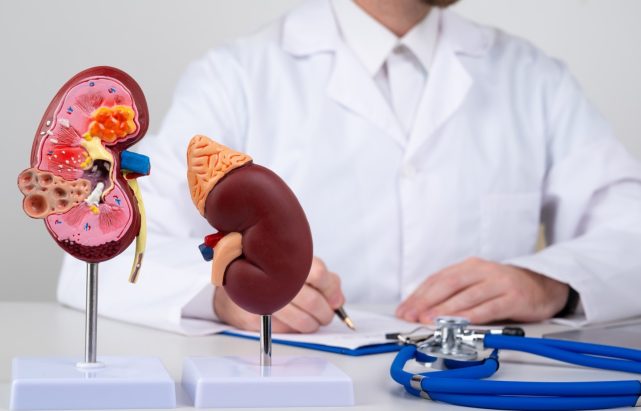Renal biopsy is a medical procedure in which a small piece of kidney tissue is removed for microscopic examination.
It is usually performed to diagnose kidney diseases, determine the severity of the condition, and evaluate the effectiveness of treatment.
Why is Renal Biopsy Done?
A renal biopsy is typically done to diagnose and evaluate conditions like:
- Glomerulonephritis (inflammation of the kidney’s filtering units)
- Nephrotic syndrome (a group of symptoms that indicate kidney damage)
- Proteinuria (excess protein in urine)
- Hematuria (blood in urine)
- Lupus nephritis (kidney damage associated with lupus)
- Polycystic kidney disease (an inherited disorder that causes fluid-filled cysts to form in the kidneys)
- Alport syndrome (a genetic disorder that affects the kidneys)
- Unexplained kidney failure
How to Prepare for a Renal Biopsy?
Before the biopsy, you will need to have some blood tests to check your clotting and kidney function.
You will also need to inform your doctor of any medications you are taking, especially blood thinners.
You will be instructed not to eat or drink anything for several hours before the procedure.
You may be given a mild sedative to help you relax.
Renal Biopsy: What to Expect?
A local anesthetic will be injected to numb the skin and tissue around the biopsy site.
The doctor will then insert a biopsy needle through the skin and into the kidney to remove a small piece of tissue.
The procedure usually takes about 30-60 minutes.
Care After Renal Biopsy
- Lie flat on your back for several hours after the biopsy to prevent bleeding.
- Avoid strenuous activity for about a week.
- Your doctor will monitor your kidney function and check for signs of bleeding.
- You may be prescribed pain relievers or antibiotics prevent infection.
Myth and Fact about Renal Biopsy
Myth: Renal biopsy can cause bleeding and kidney damage.
Fact: While bleeding and kidney damage are possible risks of the procedure, they are very rare and can usually be managed if they occur.
FAQ of Renal Biopsy
Will the biopsy hurt?
You may feel some pressure or discomfort during the biopsy, but it should not be painful. You will be given local anesthesia to numb the area.
FAQ of Renal Biopsy
How long does it take to recover from a renal biopsy?
You will need to avoid strenuous activity for a week or so after the biopsy. Your doctor will provide specific instructions for your recovery.

